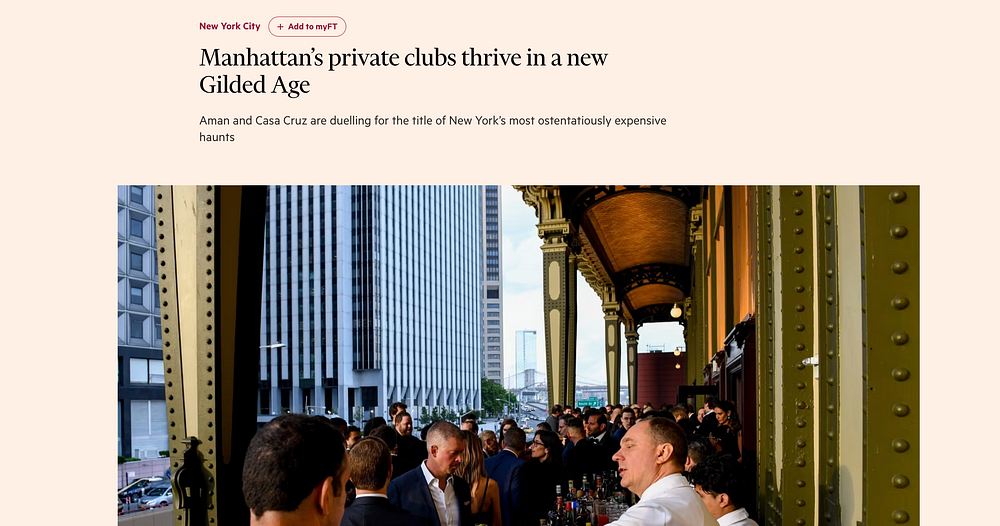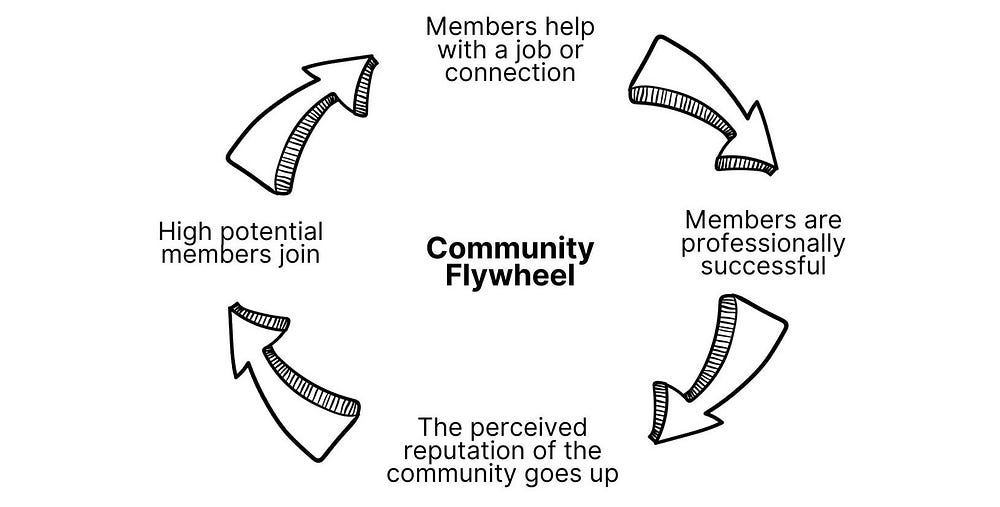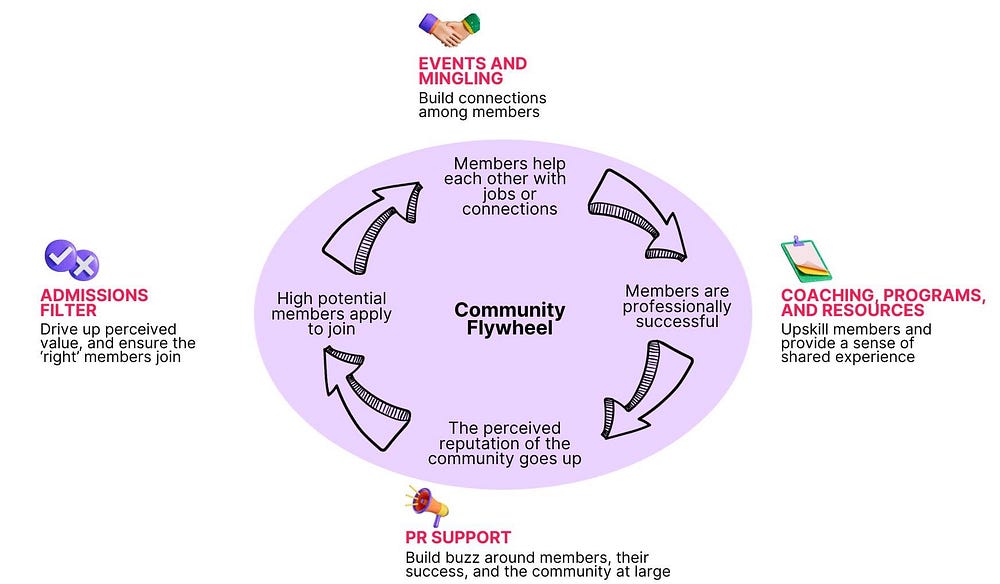The replacement to MBA programs isn’t what you think it isHow Slack could replace the MBA
The value of an MBA (Masters in Business) degree is constantly under question. And for good reason. 2 years of classes (and up to $200K+) is a big investment.
Entrepreneurs have come out with cheaper innovations. There’s Mark Ritson’s 10 week mini MBA program. Seth Godin’s month-long alternative MBA. Even various MBAs in a book. These programs cover much of the same material as a business degree. But is that why people go to business school?
Would-be MBA students aren’t looking for a cheaper MBA. The top MBA students aren’t at least. They have good job prospects. They want to invest in something that will supercharge those prospects further. The MBA killer won’t be an online accounting course… it will be … Slack.
Slack? What?
Since moving back to New York, I have joined a number of digital and physical membership clubs. These clubs offer access to a new network. Events. And best of all — people willing to help each other out.
School pride can be irrational. But it works. I will help out someone from LBS or WashU because we both went through the program.
In one of the Slack channels I am in, members include successful founders, agency creative directors, and venture capitalists. The help-wanted channel is one of the most active — with a consistent flow of people asking for advice, jobs, connections, short-term housing, and travel recs. Posts aren’t left to shrivel up and die in a digital graveyard. People respond. At the very least, others say that they too want an answer to this problem.
The Share-your-project channel is equally active. Members post their wins — receiving a flurry of fire emojis, congratulations, and typically, offers to amplify their work further in response. It’s not just a Slack group. It’s a community.
I will say that this particular Slack community requires an application and membership fee. But compared to an MBA — the cost is paltry. And, often, the ‘admissions filter’ is part of the allure. Saba Ahmed, founder of a new platform for community leaders, found that people prefer communities with a filter:
One of the interesting things I learned during user testing is that people prefer communities that require applications to join…It creates higher perceived value. — Saba Ahmed
Admissions is part of the brand of Harvard’s MBA as well. It’s not that Harvard’s MBA program is necessarily the best education (if it was, how come we can supposedly buy it in a book at the airport?). It’s that you have been vetted. You’re part of an elite group, selected for your past success and future potential. And anyone who completes the program has access to all the other Harvard vetted alumni… making them even more valuable.
The next MBA: Membership clubs?
While living in London I became acquainted with the membership club model. Soho House originated in London, and now has 10+ locations around the greater London area, along with outposts around the world. Upscale clubs like Annabel’s, The Arts Club, and 5 Hertford offer members a place to work, eat, party, mingle, and impress friends and non-members with an invite. The model is taking root in New York, with spots like Neue House, the Ned, Casa Cipriani, Zero Bond, Aman, Casa Cruz, and ZZ’s coming on the scene in the past few years. Source: The FT
Source: The FT
American hospitality groups are now working on how to differentiate their brand of club to attract luxury members. Zero Bond flaunts celebrity clientele. Carbone’s ZZ’s offers members access to their own private Carbone (as well as Chefs willing to make anything you want). Aman’s $200K initiation fee is both a cost and a feature that guarantees rubbing elbows with only the elitist of the elite. Sidenote: still in line with MBA tuition.
[ZZ’s] Carbone Privato offers “culinary concierges,” employees meant to fulfill members’ any wish or desire, be it arcane ingredients and dishes or nostalgic throwbacks. “We’re a Japanese and Italian restaurant, but my really, really experienced chefs can make your mom’s meat loaf, too,” Carbone says. — Grub Street
Aman NYC’s private rooftop terrace. Source: Town and Country
Community: the next frontier
Exclusivity is great, but value comes from community. Members need a reason to engage and support one another. Otherwise, the value of the membership stays at the sum of its parts (give or take exclusive pasta access in ZZ’s case).
Career and industry interest make for perfect community soil. You never know when you’ll need help in return, so it makes sense to help out others in a professional community, and the help will come back to you someday. Career communities (of which MBA programs are a prime example) have built this into a flywheel. The more you help alumni, the more successful the alumni base gets… which drives more people to apply, increasing the value of the logo on your resume, which increases your potential success… Career communities get more valuable over time. Source: Author
Career communities get more valuable over time. Source: Author
Startup accelerators like Y-Combinator (YC) provide a similar community. YC founders can learn from other founders in the group, increasing their odds of success. Successful startups then spur more ambitious founders to apply, which allow YC’s managers to select from a larger pool, increasing the likelihood of success of the selected group…
To accelerate the value of a community, managers can amplify each part of the flywheel. Facilitating connections between members, administering admissions, and building out the public brand of the community are key MBA program and Membership Club activities: Community Managers amplify each part of the flywheel. Source: Author
Community Managers amplify each part of the flywheel. Source: Author
Building a community brand
The hardest part of a flywheel is getting it started. A membership club (or MBA program) with no members doesn’t have much allure. High-end facilities and unique experiences can drive one-off engagements. But it’s the people of interest (and really, the potential engagement with people of interest) which build a desireable community.
One potential plan:
- Distinguished faculty, celebrity music residencies, and Michelin Chefs kickstart membership in the short run.
- Facilitate connections among early members to drive stickiness and regular engagement.
- Invest in the success of young, high potential community members once they join to build the longterm brand. Who doesn’t want to join the community where [insert successful person] got their start? Or where Andy Warhol used to party?
Random aside, as celebrities dive more into launching their own consumer brands, it may make sense for them to pivot into hospitality, and take equity over cash in membership clubs for regular appearances.
The future MBA
With membership fever taking over US cities, young, ambitious people may find themselves facing a new decision: Should I get an MBA… or join a combination of Soho House and Casa Cipriani, apply for a paid-for Slack channel in my desired industry …and read the airport MBA book on my next flight?
On the flip side, if you’re running an MBA program… building out your community chops via stronger alumni engagement, regular events, and a new digital platform might not be a bad investment.
If you liked this article, follow me and sign up for my newsletter.
Looking for help growing your company?
I run brand consultancy Embedded — where I partner with companies to grow via strategic marketing. Not sure where to start? Many clients opt for ad-hoc coaching — hourly consultations on any aspect of your growth strategy. Get in touch here.

































































